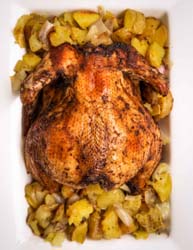 Know where your meat comes from, Marble Creek Farmstead.
Know where your meat comes from, Marble Creek Farmstead.
By Jan Walsh
Photography by Beau GustafsonMarble Creek Farmstead is a small, sustainable family farm located in Sylacauga, Alabama. The owners Jesie and Matthew Lawrence named the farm after Sylacauga, the Marble City.
Marble Creek Farmstead grows fruits, vegetables, and flowers—all free from pesticides, herbicides, and fungicides. And their forest, garden-style orchard is in the planning stages. Marble Creek Farmstead also has a line of all humanely raised, natural, pastured raised meats. If you do not know the difference between family farms and factory farms, Goggle “factory farms,” or watch Food, Inc. documentary. Unlike many factory farms where chickens are jammed in chicken houses, cattle never see much less eat grass from their muddy pens in their own filth, and pigs are kept in windowless sheds with no sunlight or fresh air, Marble Creek Farmstead’s animals are never fed genetically modified organisms GMOs. The farm raises pastured Cornish cross and red ranger broiler chickens for meat and has approximately 80 egg laying birds in mobile chicken tractors with a chicken moat coming soon. They are fed non-GMO chicken feed, some of the spent brewer’s grain from Druid City Brewing, and what they find in the pasture. In addition to the Barred Rock, Rainbow, Heritage White, and Cornish Cross broiler chickens, the Lawrences raise a small herd of Berkshire and Tamworth hogs. No rings on their pigs’ noses, these pigs enjoy life doing what comes natural, rooting around in the soil and growing up naturally. Approximately 80 percent of U.S. pigs are given Ractopamine to make them grow faster. Marble Creek Farmstead does not. They eat grass, dirt, grubs, spent brewer’s grain, and fermented grains—wheat, barley, sorghum—as well as supplemental non-GMO feed, as needed.
I met the Lawrences at Liberty Park Farmer’s Market this summer. It was a planned meeting because I had heard about their farm and wanted to purchase some of their products. I arrived early and watched as Jesie’s truck pulled up alongside the grassy park area pulling a trailer behind with two electric freezers, similar to the ones my grandmother had. Sitting in my air-conditioned car, I watched as she and another woman began to unload the trailer. Quickly realizing I could do more than just show up and buy their products, I got out and helped. We put up the tent, set up a table with a blue and white checked tablecloth. I fumbled around trying to hang their handmade wooden sign with Marble Creek Farmstead painted in white, capital letters. And I watched as they pushed and pulled until they got the freezers off the trailer and onto the street, and then carried them to the tent. As Jesie arranged melons, pumpkins, heirloom okra, kale, and heirloom tomatoes on the table, I pondered all the work it took to grow this food and to get it here. A short time afterwards, I met Matthew who came a bit later because he had to feed the animals before leaving the farm. He brought other vegetables and more meats. Realizing that I am fortunate to have access to this food that they grow for their own family, I buy fresh veggies for dinner and meats for the freezer: pork chops, brats, (more than a foot long) hot dog, country ham, bacon, and a whole chicken. So far we have only cooked the chicken, pictured here. This gorgeous bird roasted to a golden hue. It was plump, moist, and melt in the mouth delicious. In addition to farmers markets, Marble Creek Farms has just started a CSA (community supported agriculture), where members can pick up their products in downtown Birmingham, Hoover, and Highway 280. Of course, I am signing up!
Published, B-Metro magazine, October 2015